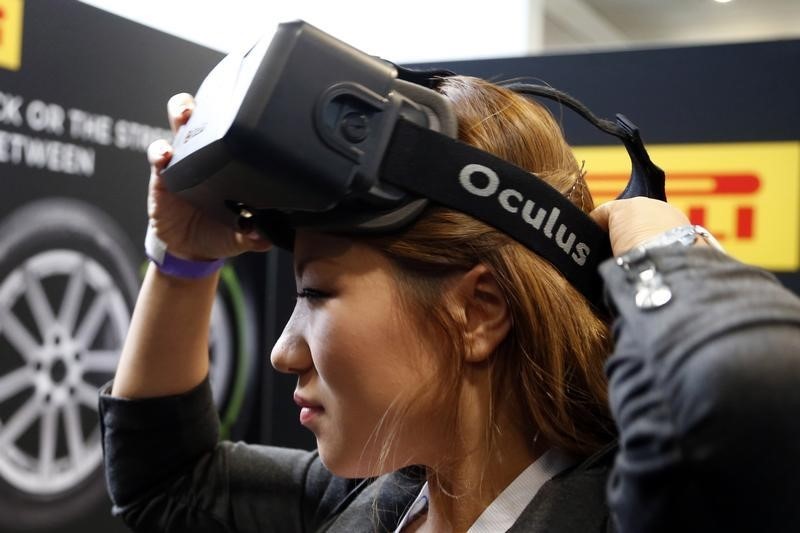By Yasmeen Abutaleb
SAN FRANCISCO (Reuters) - To help treat soldiers with post-traumatic stress disorder, Jennifer Patterson turned to a gadget typically associated with video games: the virtual reality headset from Oculus, a company Facebook Inc (NASDAQ:FB) bought for $2 billion last year.
Patterson, an engineering student at the University of Pittsburgh, studied a software used on the prototype of the head-mounted display that creates virtual settings, such as a Middle Eastern-themed city or desert road, that soldiers would otherwise avoid, as a way to help them recover from their PTSD.
She hopes doctors and therapists around the country will better understand how the technology can be helpful to their own patients.
Patterson is one of a handful of researchers who have used the display for experimental treatments and studies that range from treating glaucoma patients to easing pain in burn victims.
Whilst there are no estimates of the potential size of the market for virtual reality applications in the health care field, analysts say that success in this area would likely spur even broader adoption in a range of industries, such as education, fashion, media and telecommunications.
The potential size of those markets is quite large, possibly surpassing $5 billion over the next three years, according to some estimates, especially as the gadget's uses extend far beyond gaming.
Facebook CEO Mark Zuckerberg has said he views virtual reality as the next major computing platform, and he is working hard to ensure that it is. Whilst Oculus headsets will not be available to consumers until 2016, the company has made prototypes of the system available to developers since 2013, with the expectation that an array of applications will be available to those buying headsets after the formal launch.
The company plans to hold a news event Thursday in San Francisco but has not specified what it will announce. It declined to comment for this storey.
Virtual reality is not new to medicine or therapy, but its affordability is. Doctors and researchers often shell out $30,000 to more than $300,000 for medical headsets and simulators whilst the Oculus is available to developers for $350 to $400.
The more expensive medical virtual reality sets will still be needed for certain studies, doctors and researchers said, because of their accuracy in detecting sensitive movements and because patients with severe facial burns cannot use a head-mounted Oculus device.
But they still expect the Oculus Rift and other cheaper virtual reality headsets to quickly replace the expensive ones.
"As more and more companies get involved in this, we will keep seeing inexpensive and very accurate systems," said Felipe Medeiros, a professor at the University of California San Diego who used the Oculus device to evaluate patients with glaucoma, a disease of the eye's optic nerve.
FLOOD VIRTUAL MARKET
Other companies, including Sony Corp, Samsung Electronics (LONDON:0593xq) Co Ltd, Microsoft Corp (NASDAQ:MSFT), Google Inc (NASDAQ:GOOGL) and HTC Corp have either already released virtual reality headsets or plan to do so in the next year.
Oculus, however, has already distributed more than 100,000 units of its developer version. This is more than has been available in the history of virtual reality, giving it early brand recognition among medical researchers, analysts said.
"Oculus has basically jumped out in front," said Hunter Hoffman, a virtual reality researcher at the University of Washington Seattle who used the Oculus Rift to ease severe pain in an 11-year-old burn victim.
Some headsets, such as Sony's Morpheus, are built exclusively for video games. Oculus, however, allows researchers and developers to create their own software, whether for specialised applications like health care or for video games.
In Medeiros's study, for example, he evaluated patients with glaucoma. He created a simulated environment that made patients feel as though they were moving through a tunnel and then studied their bodies' responses.
That helped researchers predict the likelihood of a fall for glaucoma patients, allowing doctors to teach them how to avoid it.
Medeiros and other researchers said future studies will compare the inexpensive headsets against one another. But because of Oculus's early availability, it has already become the most popular headset.

"Oculus has done a great job of keeping themselves front and centre and making themselves the product that everyone has to be compared against," said Brian Blau, Gartner research director.